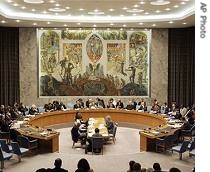2007年VOA标准英语-UN Security Council Goes on Kosovo Fact-Finding(在线收听)
New York
24 April 2007
U.N. Security Council ambassadors are going on a fact-finding mission to the Balkans this week as they consider the future status of Kosovo. VOA's Peter Heinlein at U.N. headquarters reports the mission will meet officials in the provincial capital, Pristina, as well as in Belgrade.

United Nations Security Council debates at UN headquarters, 17 Apr 2007
The 15-member Security Council delegation will stop first in Vienna and Brussels, then on to the region. The mission leader, Belgium's U.N. Ambassador Johan Verbeke, says the six-day trip will include talks with Serbia's leaders, as well as with the heads of Kosovo's Provisional government and leaders of the Kosovo's ethnic minority community.
"[We will see] how the situation is over there, that is to be fully briefed, well informed so that we can indeed live up to the high expectations that reside in the Security Council, and that we can act responsibly on what is obviously a delicate matter," he said.
On the eve of the trip, Council members received a briefing on conditions in Kosovo from U.N. Peacekeeping Operations chief Jean Marie-Guehenno. He says he told them they face tough decisions about the progress made since the U.N mission in Kosovo known as UNMIK began running the region in 1999.
"It will allow them to see with their own eyes what the situation is, with all its difficulties. I did not paint a rosy picture of Kosovo; and at the same time I described honestly the progress as it is, in various areas so it's all shades of gray," said Marie-Guehenno.
The United States has endorsed recommendations made by U.N. envoy and former Finnish president Martti Ahtisaari to grant independence to the ethnic Albanian majority Serbian province in a phased process.
The new U.S. ambassador to the world body Zalmay Khalilzad is making the trip to the Balkans in his first week on the job. He called his presence a sign of the importance Washington attaches to the issue.
"It's very important, Balkans is another region of world that has been the source of a lot of insecurity, and sometimes leaving problems festering for a long time, unattended can lead to bigger problems, and it's very important to bring this issue of Kosovo to a successful conclusion," he said. "And I look forward to the trip."
"The message is that the time has come to bring this to closure," replied Khalilzad when asked "What's the message going to be to the people in Kosovo?"
Russia strongly opposes the Ahtisaari independence plan. Deputy Foreign Minister Vladimir Titov was quoted by Russian news agencies as saying Moscow will not accept the Ahitisaari proposal because of Serbian opposition.
Russia asked for the Security Council visit to the region, and Moscow's U.N. Ambassador Vitaly Churkin is a member of the delegation. On the eve of his departure, Ambassador Churkin expressed concern about the safety and security of minority populations in an overwhelmingly ethnic Albanian region.
"Two most graphic elements of the situation that we need to keep in mind when we deliberate is that very few Serb refugees have returned to Kosovo after the events of 1999, and there are no normal conditions for the life of ethnic minorities," he said.
The delegation is expected back in New York by Monday, and will prepare a report on its findings.
In his report to Secretary-General Ban Ki-moon, special envoy Ahtisaari said Kosovo could become politically stable and economically viable only if it were independent. Ethnic Albanians outnumber Serbs and other minorities in the province by a nine-to-one margin.